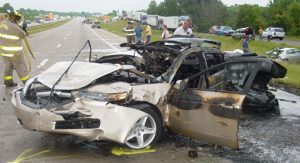 In the same way that additional charges are often added to a DWI, excessive speeding or irregular driving often results in an additional charge of what is commonly known as reckless driving in addition to any other violations. While the term reckless driving is commonly known among most citizens, only 13 states actually have reckless driving laws on the books, and most of them have murky definitions of the law. It’s common for drivers to think that reckless driving is equivalent to a set number of miles per hour a person goes beyond the posted speed limit. However only one state, Virginia, explicitly outlines how fast, or how much a person must exceed the speed limit (80 mph, or 20 mph over, respectively) in order for the behavior to be considered reckless driving. Washington and Virginia outline other, non-speed-related conditions that qualify as reckless driving (Virginia has 24 unique examples, while Washington only includes street racing specifically). The rest of the states with reckless driving laws simply state, generally, that a person operating a vehicle with “general disregard for public safety” is guilty of reckless driving.
In the same way that additional charges are often added to a DWI, excessive speeding or irregular driving often results in an additional charge of what is commonly known as reckless driving in addition to any other violations. While the term reckless driving is commonly known among most citizens, only 13 states actually have reckless driving laws on the books, and most of them have murky definitions of the law. It’s common for drivers to think that reckless driving is equivalent to a set number of miles per hour a person goes beyond the posted speed limit. However only one state, Virginia, explicitly outlines how fast, or how much a person must exceed the speed limit (80 mph, or 20 mph over, respectively) in order for the behavior to be considered reckless driving. Washington and Virginia outline other, non-speed-related conditions that qualify as reckless driving (Virginia has 24 unique examples, while Washington only includes street racing specifically). The rest of the states with reckless driving laws simply state, generally, that a person operating a vehicle with “general disregard for public safety” is guilty of reckless driving.
Missouri is one of the majority of states that lacks an explicit law for reckless driving, though it has a similar set of laws called “Careless and Imprudent” driving. Under these laws, drivers are required to operate their vehicle and manage their speed in a manner that is “careful and prudent,” and must not operate their vehicle with the intent to endanger property of the personal safety of another. Similar to the “disregard for public safety” approach, the law is not clearly defined beyond these few statements. Generally, officers only issue a C&I charge if a person was involved in an accident, and particularly if there was an injury or significant property damage as a result of the accident. However, because the law is not specific, you can see this charge added if the officer feels your speed was excessive, or if you were driving erratically or weaving through traffic.
A C&I charge is not something to be taken lightly. It is considered a Class B misdemeanor, and can result in up to six months in jail and a $500 fine. If you are involved in an accident and charged with a C&P, it is upgraded to a Class A misdemeanor, which comes with up to a year in jail and a $1,000 fine. The murky nature of the law does make it potentially easier to fight in court, so if you find yourself with a C&I charge, you should seek out legal assistance to avoid the potentially serious punishments that accompany your charge.